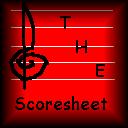THE
PEACEMAKER
by Hans Zimmer
If you want some loud, bombastic action music, look no further than "The
Peacemaker." Hans Zimmer uses a 104-piece orchestra, a huge choir,
and a battery of synth effects. What makes me enjoy this more than
a lot of other Zimmer scores is a lack of the obnoxious electric guitar.
What you do get, though, is a booming orchestral score with driving synth
percussion. (In some sections, the powerful bass is enough to make a house
shake!) The downside to this is that the action sometimes dissolves
into dissonant, foreboding noise (for example, see sections of track 4.)
Another minus is the fact that Zimmer edits his music into long suites,
the longest of which is 17 minutes. This presents a problem when
one is trying to find a specific section. (Not to mention that it makes
the CD as hard as *#$% to review.)
Track by Track Analysis:
1. Trains (13:51)
Zimmer opens with an oppressive string motif. This continues
to build, is joined by synths, and eventually explodes into a full orchestral
tutti. After a few seconds of ambiance, he introduces one of the
principal themes, a militaristic march backed by synth bursts. It
exhausts itself, and the massive choir enters singing a mournful anthem.
Zimmer expands on the opening motif, and this is followed by a few minutes
of building synth rhythms. The choir sings a few measures, then a
section of the main action motif (to be fully stated in Track 4) appears.
An interesting technique he does here is interpolate a section of the ethnic
"Sarajevo" motif in the background. A few minutes of expansion upon
the action motif follows, including more "Sarajevo." Near the end
of the track, the choir reappears, singing hints of their main motif (reminiscent
of the Lion King score.) More expansion upon the main action motif
rounds out the track. Overall, this is one of the more generic tracks
album.
2. Devoe's Revenge (5:14) by Gavin Greenway
For this track, Greenway introduces several of Zimmer's main action
motifs to be heard later. I usually skip it, simply because the themes
are heard more fully in other tracks (i.e. Enough is enough!)
3. Sarajevo (8:40)
Zimmer departs from his usual style and gives us a break from the action
with this intensely moving suite. After a statement of the introduction
of track 4, the choir introduces the complete version of their theme from
track 1. For the next few minutes, the composer gives some ambient
rumblings, with the theme stated occasionally. Eventually an alternate
of the choir's theme plays, this time by the orchestra. At the 5
minute mark, he introduces the Sarajevo theme, the high point of the score.
Even more enjoyable is when he introduces a desolate solo soprano backed
by the entire choir. For the last minute, a mandolin backed by choir
plays the Sarajevo theme again.
4. Chase (17:04)
Although it sometimes becomes wearing, "Chase" is the best action cue
on the album. Zimmer begins with a suspense-building string motif
ending on a strong brass cadence. After a short section reminiscent
of the previous track, he extends the action theme from track 1 into a
exciting, testosterone-charged monstrosity. The opening string motif
restates, and the action theme plays again in all its glory. After
some dissonant suspense music and a huge cadence, the choir gives a short
break, and the climax of the action theme returns. This time, however,
it continues to build, and the choral motif plays on top of it. Finally,
when it seems it can't go anywhere else, Zimmer has the choir sing its
entire theme over the frenetic action motif. Nondescript variations
on the various musical ideas comprise the next few minutes. There
are several good variations on the choral motif. The track ends with
a final statement of the climax of the action motif.
5. Peacemaker (9:47)
For the final suite on the album, Zimmer successfully blends the mysterious,
moving style from track 3 with the bombastic action bits from tracks 1
& 4. It begins with a full statement of the choral theme followed
by several minutes of permutations on that pesky action theme from "Trains."
A powerful statement of the choral theme ends the sometimes-mindless action,
however, and the rest of the disc is based upon it. The mandolin
comes in with a restatement of the Sarajevo theme, and that beautiful soprano
voice from track 3 returns backed by full choir. Obviously one of
the high points of the album, and even more moving than the end of track
3 IMHO. The score ends with a final statement of the Sarajevo theme
on the mandolin.
Overall, if you want just one loud Zimmer action score, I can heartily
recommend this. There are very few annoying synth noises, and
the Sarajevo theme is almost worth the price of the album. The action
music tends to get out of hand sometimes, but overall, this is a good score.
However, the length category gets several points deducted because of the
troublesomely long tracks.
The Peacemaker: The Final Score
| Music Rating |
7/10 |
|
|
| Packaging/Liner Notes |
N/A |
| Orchestral Performance |
9/10 |
| Sound Quality |
8/10 |
| Length |
4/10 |
| Overall |
28/40 |

| Reviews
by Title | Reviews
by Composer | Links
Page | ScoreSheet
Home |
The Peacemaker is Copyright 1997 by Dreamworks Records. Its appearance
on this site is for informational, non-profit use only. Review Copyright
1999 by Andrew Drannon. Opinions expressed are not those of Tripod.